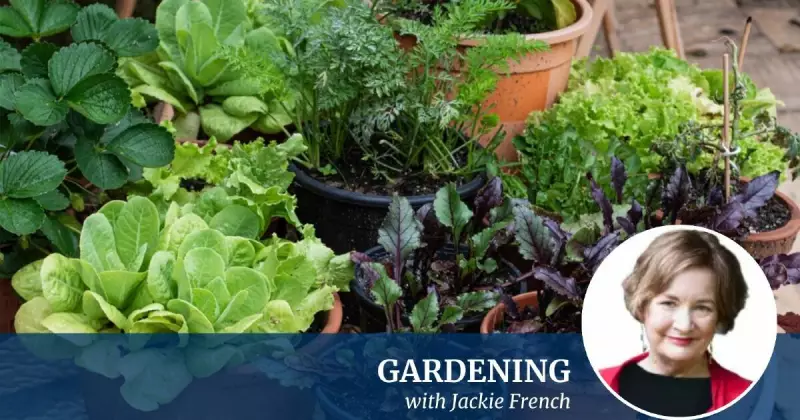
Transform Your Space with a Daily Harvest Garden
Imagine stepping outside your door to gather fresh ingredients for every meal, even if it's just parsley to sprinkle on takeaway pizza. According to renowned Australian gardening expert Jackie French, the most valuable vegetable garden is one you use daily, and the most successful one is positioned right outside your front, back, or garage door.
The secret to a garden you'll actually use is convenience and accessibility. A potted kitchen garden can be placed exactly where needed, even on a balcony, making it impossible to ignore because you're regularly harvesting from it.
Outsmarting Australian Wildlife in Your Garden
French shares her personal experience with common Australian garden challenges. "Our resident wallaby has just munched all my basil and chives, and Possum X has decided he loves coriander and lettuce as much as parsley," she notes. However, as the dominant species (though this is contested by cats and wombats), humans can outwit these hungry visitors.
The solution? Use tubs and large pots with wire 'lids' that can be easily covered and uncovered. This simple method protects your precious plants while maintaining easy access for daily harvesting.
Essential Plants for Your Potted Paradise
All the plants French recommends grow exceptionally well in pots, often thriving better than in garden beds when placed on sun-drenched concrete or pavers. Here are her top picks for creating a living larder you can plunder year-round:
Kitchen Garden Staples:
Parsley: Grow half a dozen continental and curly parsley plants. Use scissors or a food processor to create fine green specks to add to anything savory.
Coriander: Keep in dappled shade and maintain moisture to prevent premature flowering. Perfect for sushi, rice paper rolls, and salad sandwiches.
Rabbit ear and frilly lettuce: With weekly feeding and watering, you can harvest leaves as needed with more growing continuously.
Chives: You need at least six bushes. A scattering looks professional, while larger quantities can replace onions in recipes.
Basil: Choose plain green and perhaps purple varieties for variety. Remove flowers regularly to encourage leaf production.
Cherry tomatoes: One large bush in a big pot, fed weekly and watered daily, should yield several cups of fruit weekly.
Rocket: With semi-shade and regular watering, the leaves add tang without bitterness.
Flavour Enhancers and Herbal Tea Plants
French also recommends several flavour-enhancing herbs and plants for homemade teas:
Thyme: Common thyme works well for stuffings and meatballs, while wild thyme offers a stronger flavour for cooking.
Sage: Use sparingly - just four shredded leaves can enhance roast chicken stuffing.
Winter Savoury: French's secret ingredient for chicken soup and stuffings, with a fragrance stronger than thyme.
Rosemary: Add a branch to the oven rather than directly to food to avoid overwhelming flavours.
Lemon verbena: Perfect for herbal tea and grows superbly in pots.
Peppermint: Specifically Black Forest mint for tea, different from culinary mint varieties.
Dwarf lemon: A squeeze enhances almost everything, and lemon slices with ice water make the perfect summer refresher.
Practical Gardening Tips for Australian Conditions
French shares valuable insights from her current gardening activities, including watering seedlings daily and dealing with germination challenges. She emphasizes the importance of sourcing seeds from reliable suppliers and planting from multiple sources to identify whether poor germination is due to seed quality or environmental factors.
For holiday watering, she suggests a simple DIY solution: use a large plastic bottle pierced once at the base, filled with water and placed in the pot to slowly dribble moisture. For a more elegant approach, consider a dripper line.
French's approach demonstrates that successful gardening doesn't require extensive space or expertise - just strategic placement, appropriate plant selection, and simple solutions to common challenges. Her potted kitchen garden philosophy proves that fresh, homegrown ingredients can be accessible to everyone, regardless of their living situation.





